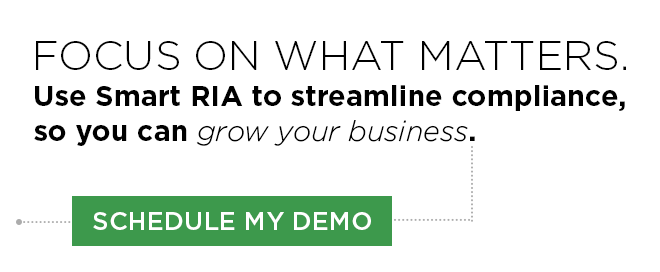
The Department of Labor Fiduciary Rule is set to start a year-long rollout in April 2017, placing fiduciary responsibility to act in the best interest of the client on the shoulders of independent broker-dealers, investment advisors, and other professionals who deal with investment accounts covered under the Employee Retirement Income Security Act of 1974.
While there is some speculation that the incoming administration will kill the new rule before it gets started, that is easier said than done. In the meantime, it’s best to proceed as though the DOL Fiduciary Rule is a done deal.
Fortunately for RIAs, who are already bound by fiduciary duty to act in the best interest of their clients and document the process through SEC compliance, the new DOL Fiduciary Rule will only require a few (but important) changes.
RIAs will have a new document added to the mix: the BICE, or Best Interest Contract Exemption. This document discloses conflicts of interest and advisor compensation to the client, both of which RIAs were required to do anyway. But, since the BICE is a legal contract binding the advisor to act in the best interest of the client, it does open the advisor to civil lawsuits from clients who don’t feel they were protected.
When you go over a BICE contract with your clients, it’s bound to raise some questions. Here are a few talking points that can help you navigate these conversations more easily.
Changes in the Retirement Landscape
These new rules are necessary because the way we save for retirement has changed. When ERISA became law in 1974, 401k retirement plans hadn’t been invented yet, and IRAs were brand new. Most people were counting on pensions from an employer to see them through their golden years. Now, most people save for retirement themselves through investment accounts, relying on investment advice from professionals to make sound decisions for their future.
Suitable vs. Best Interest
Before the DOL Fiduciary Rule, independent broker-dealers were only bound to ensure that investments were “suitable” for their clients, a term that was open to interpretation. Broker-dealers compensated on commission could use this term to advise their clients into undertaking investments that were technically suitable, but yielded higher commissions, and so were not actually in the clients’ best interest. The DOL Fiduciary Rule is designed to protect investors from these practices.
RIAs Are Already Fiduciaries
Investment News called the DOL Fiduciary Rule a “huge win” for RIAs. Since RIAs have been subject to SEC compliance for many years, they’re accustomed to documenting client interactions and providing records illustrating that they’ve acted in the best interests of their clients. Assure your clients that as a wealth investment advisor, you have always been bound by law to act in their best interest and will continue to do so under the new rule.
No matter what’s on the horizon for RIAs under the DOL Fiduciary Rule, you can streamline your existing compliance needs and stay up to date on new rules with a great compliance software solution. Keeping those tasks on track and off your to-do list will give you peace of mind and plenty of time to educate your clients on these new requirements.
Smartria is an all-in-one platform that will keep you ahead of the curve as the compliance landscape shifts and changes. Just fill out this convenient online form to schedule a demo at your convenience.


